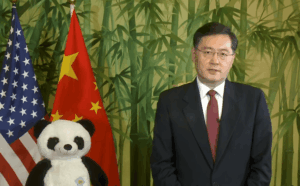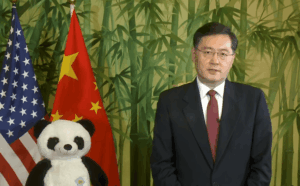
Imagine you are working as an investment banker in one of China’s most famous companies. Everything is going well — a high-paying job, good social status, and finally, you’re making money from the math you learned in university. Then, suddenly, your CEO disappears! This is what happened in China.
Bao Fan, a Chinese billionaire and chief executive of China Renaissance Holdings, went missing in February 2023. A year later, news came out that he had resigned from all roles at his firm. Still, no one knows where he is. This is not a unique event — it is part of a larger phenomenon: the disappearing Chinese CEOs.
The Economist published an article titled “The Case of China’s Vanishing Chairmen.” Losing contact with chief executives has become a common theme in China. Two listed Chinese companies announced in November 2023 that “their chairmen had vanished without a trace.” They tried to reach them via WeChat and contacted family members, but with no success. There’s an interesting pattern: executives most often disappear from firms with high levels of debt. This phenomenon of disappearing CEOs reveals something deeper. It’s not just a tactic of the Communist Party; it exposes an inherent flaw in the Chinese model.
‘The Machine Refused to Obey’
The mixture of capitalism and socialism is not new.
Though with different characteristics, Lenin tried state capitalism as well. After the enormous failures of his War Communism policies (7,196 percent inflation in 1922, just to name one), he launched the New Economic Policy (NEP). And from the beginning, he noticed the problems of state capitalism.
In 1922, he said,
The machine refused to obey the hand that guided it… It was like a car that was going not in the direction the driver desired, but in the direction someone else desired — as if it were being driven by some mysterious, lawless hand, God knows whose, perhaps of a profiteer, or of a private capitalist, or of both.
It wasn’t a lawless hand; it was the invisible hand. Lenin’s subtle but profound amazement reveals the flaw in the Chinese model: the machine refuses to obey the party that guided it.
The Internal Contradictions of State Capitalism
The term internal contradiction is mostly used in Marxist literature, but it’s well-suited to explain what’s happening in China and other state capitalist countries. There’s an inherent paradox in the Chinese model — after a while, the vague distinction between market and state stops working. One of Xi’s favorite sectors is the public-private partnerships: firms that aren’t fully state-owned or privately owned, but a mixture. In theory, they aim to capture the productivity and efficiency of the free market, but at the same time, they resist the mission-indirection that is inherent to market processes.
This is the core contradiction. The productivity and efficiency of the private sector are possible only through risk-taking — betting on an unknowable future. That’s why Frank Knight argued that entrepreneurial action is tragic at heart — it is uncertainty. And the sad truth is: most entrepreneurs fail. According to the US Bureau of Labor Statistics, 49 percent of new businesses fail in their first five years. But this failure is as important as success. It’s what makes economic growth possible. As Ludwig von Mises wrote, “It is profit and loss that force the capitalists to employ their capital for the best possible service to the consumers.” Without loss, there is no discovery. Without discovery, there is no innovation.
The “loss” part is what guides us. But the Chinese model — and all state capitalist models — seek to eliminate loss, through regulation or planners’ “wisdom.” They want an economic system that doesn’t fail. But what we get is the vanishing of CEOs and chairmen. The internal uncertainty embodied in the market cannot be solved with government regulation and planning. Uncertainty should be embraced rather than tamed, because it deals with known unknowns and unknown unknowns. Only epistemological humility can help us navigate it, not attempts to play God.
The Future of State Capitalism
Although the Chinese model is showing its weaknesses — from vanishing CEOs to shrinking growth — it seems the world is moving toward state capitalism. As Ilias Alami and Adam Dixon argue in their book The Spectre of State Capitalism, this is a global phenomenon, not confined to China and Asia. Since 2000, the scales of the mixed economy have tilted toward the state. The number of state-owned enterprises (SOEs) among the world’s 2,000 largest firms has doubled over that period. These state-linked giants now control $45 trillion in assets — half of global GDP. And it’s not only SOEs. The number of sovereign wealth funds (SWFs) has increased sixfold in the past two decades. As of 2024, 176 sovereign wealth funds operate worldwide. By 2023 figures, they control $11.8 trillion in assets — more than any hedge fund in the world.
The world is drifting toward greater statism — a trend that is far from new. As Milton Friedman put it in one of his final speeches:
After the fall of communism, everybody in the world agreed that socialism was a failure. Everybody in the world, more or less, agreed that capitalism was a success. And every capitalist country in the world apparently deduced from that what the West needed was more socialism.
His remark captures the irony of our time: even in victory, capitalism is retreating.
The double-digit inflation of the COVID era, the productivity puzzle in the West, shrinking growth, and vanishing CEOs in the East are all signs of the failure of the state capitalist model. But we can’t overcome this new statism until we change the climate of opinion. The challenge is that this model is portrayed as “neoliberalism” or “capitalism.” At least with postwar statism, everyone agreed it was statism. But not this time. If you read the so-called critiques of neoliberalism, it sounds like we are living in Nozick’s Utopia — but we’re not. The evidence is quite clear, and we must understand this new statism in order to overcome it.




